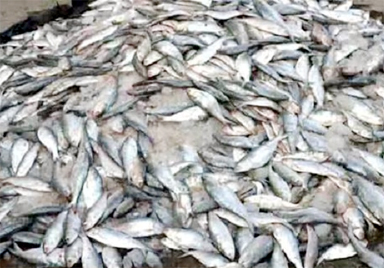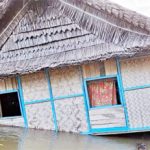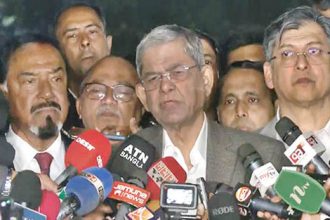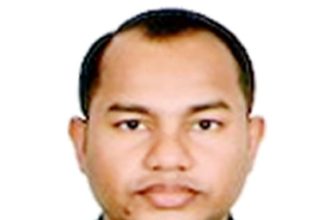By Shudir Baran Mazi
From March 1 to April 30, all fishing, including jatka, is prohibited in the river, but fishermen are fishing in the river with joy. They turn the prohibition period into a fishing festival. During the prohibition period, catching jatka and other fish in the river becomes reckless. Especially up to Ghazaria in Munshiganj, Charbhairavi, Ishanbala, Katakhali, Telirmor, Haimchar Launch Ghat, Old College Ground, Badamtali, Megher Char, Lakshmipur, Shariatpur, Bhola and Barisal in Haimchar are killing Jatka and other fishes freely with prohibited current nets in broad daylight under the nose of the administration. in progress Harinaghat, Bahria, Mahanpur and Ghazaria Rajarajeshwar fishermen are extremely reckless and aggressive. If fishing cannot be stopped during the prohibited period, the hilsa crisis will intensify in the coming days and the government’s lofty plan for hilsa will fail. If our designated rivers can be made boat-free during the scheduled period from 1st March to 30th April, our rivers will be full of delicious and nutritious hilsa and other fish in the coming days. Converting jatka into hilsa is most important in increasing hilsa production. There is a huge demand for hilsa worldwide. Hilsa can be the perfect product to keep the wheels of the country’s economy moving on the path of development. Hilsa, our national heritage, will one day fall into the ranks of extinct species without solving the human-made problems from environmental problems. It is hoped that the joint efforts of the government and the people to increase the production and growth rate of Hilsa will pave the way to solve the problem. And if the solution fails, Hilsa, one of the sectors with potential for prosperity, will become fragile.
Like every year, ‘Special Combing Operation-2024’ has been started on January 11 this year. This operation, which started on January 11, will be completed in four phases in a total of 30 days, but statistics show that every year, even after the combing operation to stop the use of prohibited nets, the production of hilsa is decreasing instead of increasing. Lax monitoring of local administrations and laxity in law enforcement can be blamed for this. 100-200 yards of net spread in the river prevents the fish from coming to the river estuary to breed. Jatka killing cannot be brought under control due to lax monitoring. As a result, there is an abundance of jatka, not hilsa, in the market. However, there is another important reason behind the excess of Jatka. As the fishermen have no alternative source of work, it is very difficult to prevent the Jatka from killing. If the districts do not succeed in the Jataka protection campaign, the districts will face a great crisis in the coming days in terms of economic, social, nutritional needs and daily living. And if not, Hilsa will not be found in the river in the future, it will be found in the museum. The work that the fishermen are doing during the prohibition period is like killing themselves.
In order to continue the production of hilsa, emphasis should be placed on the preservation of the river environment. In order to maintain the production of Hilsa, we need to keep a close watch to maintain the breeding cycle of fishes and not to pollute the waters. On the other hand, illegal and illegal extraction of sand along with climate change is making the navigable crisis of the river more visible day by day. Due to filling of the river, river pollution and climate, huge char is rising on the river bed. However, the breeding of hilsa requires navigable and clean water. As the sea level is rising due to global warming, the salinity of the water is also increasing. As a result, the amount of salt in the water of the navigable river is also increasing, which hinders the proliferation of hilsa. Apart from this, the wastes of the factories built along the banks of the river are mixing with the river water and spoiling the water clarity. The shallower the river, the more polluted it is. As the river depth decreases due to encroachment and grazing, it naturally becomes difficult to maintain water clarity.Lack of sufficient rains during the monsoons also leads to overgrazing and water turbidity, which creates a completely unfavorable environment for the growth of hilsa production.
To increase the production of hilsa, relevant plans should be adopted and proper implementation of those plans is required. Without mother hen eggs, holistic measures are needed to ensure jatka growth and breeding readiness in the following year. It is the need of the hour to remove the navigable crisis of the river and make the river free from encroachment and pollution. In order to keep the river clean and flowing, proper management of the waste discharged from the factories built in the river basin should be ensured.At the same time strict laws should be formulated and enforced to prevent encroachment. It is also important to ensure strict monitoring in this case. Mobile courts can play an effective role in strengthening surveillance.
The fishermen should understand that the owners of this hilsa are the fishermen. Therefore fishermen have to take responsibility for protecting and nurturing Hilsa. In this case, the government and administration are their best allies. Just as a child takes the responsibility of its parents when raising a child, the other fish in the Hilsa river are the same in the life of fishermen. The stricter the administration, the more successful the jatka and hilsa protection activities will be. If the Jatka can be saved, the fishermen’s lives will be economically sound and secure, just like the wheels of the state’s economy will also be in motion.The dollar will also play a role in dealing with the crisis. We want to see a successful campaign to protect Jatka. No matter how hard and difficult it is. In order to protect Jatka and other fish in the river, extensive surveillance by the law enforcement agencies, strict enforcement of the law, along with the navigability and speed of the river should be maintained. All types of non-fishing campaign in the river during the prohibited season must be 100% successful. Textbooks of primary, secondary and higher secondary levels should also create mass publicity and awareness by including the merits of protecting Jatka and the evils of killing Jatka. Seasonal work should be arranged for fishermen. At this time, the lakes can be cut in the chars and fish can be farmed there by these fishermen. In order to make this campaign successful, the administration should come forward as well as the conscious citizens.
Although catching jatka is prohibited ……

Leave a comment








